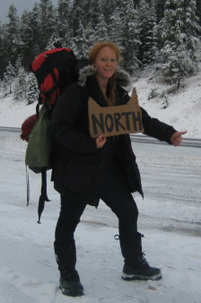Hitchhiking leaves a lot of time to think.
BBC Human PlanetWe have celebrated the land and the seas with Planet Earth and Blue Planet; now its about time that we turn an eye to the fascinating cultures that share space on our rock in the sky. These cultures are disappearing at the same rate that the wonderful and rare animals are, so it is great that BBC decided to record them too.
The above links to an audio slideshow made by a photographer who accompanied the filmmakers/
http://www.bbc.co.uk/news/world-12618167. Below is the BBC trailer.
World Press Photo of the Year 2011Sometimes a picture really does speak a thousand words. Taken by Samuel Aranda in a mosque-cum-hospital in Yemen, during the Arab Spring. http://www.worldpressphoto.org/
Women shouldn't be afraid to hitchhike. Read my advice on staying safe. Hitchhiking can be an incredible experience for women, solo or not. Of course there are tons of horror stories out there, especially if you come from the Americas and have heard of the multitude of psycho prostitute killers that seem to roam the streets. But in reality the experience of hitching as a woman has many benefits, not least of which is that people are always willing to go out of their way to help you and keep you safe. Plus, if you are in more conservative parts of the world, as a woman you will have access to parts of the culture completely off limits to men. Of course there is the security issue, but it doesn't have to be as big of a factor as many people point out. In two and a half years I have still never been in a truly bad situation. Try reading my advice article and contact me if you have any questions or need encouragement :)Sometimes a picture really does speak a thousand words. Taken by Samuel Aranda in a mosque-cum-hospital in Yemen, during the Arab Spring. http://www.worldpressphoto.org/
SOPA? Another attempt to slip one past the masses
|
|
The following is a comment I wrote to the TED Talk by Clay Shirky where he outlines the meaning and danger of the SOPA and PIPA acts that the US congress is currently contemplating. It seems unfortunate to me that, even in a community filled with brilliant people such as TED, the majority of the discussion was focused on whether or not piracy of copyrighted material was a problem. Yes it is a related issue, but of small importance when considering the real implications SOPA could have.
|
"What Monsanto did to agriculture, SOPA could do to the internet. Arguing about whether or not media piracy is a problem misses the point by a mile, because SOPA wont stop it and will likely not even have a big effect on it. US users will still be able to access copyrighted-media sharing sites (based in other countries) simply by knowing their IP address.
The two things that WILL happen are: 1) US-based sites that facilitate interaction between US citizens will be targeted. Places where we share our ideas (and may occasionally reference/use copyrighted material) will become scapegoats and could get shut down or become highly censored. And 2) Countries around the world, particularly dictatorships, will follow the US model and use it as an excuse to censor their citizens and prevent uprisings. How much would we known of Egypt, Libya, Tunisia and now Syria without their free, unfiltered access to social media?
Saying SOPA is an anti-piracy initiative trying to protect our media industry is just another government attempt to slip a ridiculously harmful law into the books while we look the other way because the actors/writers/artists etc that we look up to are supportive. Lets not fall for it!"
The two things that WILL happen are: 1) US-based sites that facilitate interaction between US citizens will be targeted. Places where we share our ideas (and may occasionally reference/use copyrighted material) will become scapegoats and could get shut down or become highly censored. And 2) Countries around the world, particularly dictatorships, will follow the US model and use it as an excuse to censor their citizens and prevent uprisings. How much would we known of Egypt, Libya, Tunisia and now Syria without their free, unfiltered access to social media?
Saying SOPA is an anti-piracy initiative trying to protect our media industry is just another government attempt to slip a ridiculously harmful law into the books while we look the other way because the actors/writers/artists etc that we look up to are supportive. Lets not fall for it!"
Another video that lays SOPA out clearly, from the website Fight for the Future
Follow Up: The SOPA vote has been postponed (for now). See here. Score one for the people! But keep vigilant, they are bound to try again.
Choosing a new language

26/09/2011
Lately I have been trying to decide what language to learn next. I started on Russian a few months ago and was enjoying it, but it got put far back on the back-burner in light of recent events. Now that I am thinking of recommencing, the debate between Russian, Arabic and Chinese -Mandarin has started up again too. The criteria for deciding aren't surprising: something useful and practical. Useful in the sense that it can be widely used (particularly while traveling), and practical in the sense that it will be possible to become conversation-competent on my own.
Here is an interesting article on what author Anatoly Karlin calls the "10 Most Useful Languages". There are a few good links to other sites, particularly the one on "Why Chinese is So Damn Hard". I would say I am re-convinced to stick to Русский. It is widely spoken in the Central Asian countries I am heading to, and in relation to the other two choices? Well, Arabic seems way too hard without an Arabic teacher or cultural submersion and there is way too much memorization in the Chinese languages, although conversation might be feasible if literacy is not the focus.
On a related note, for anyone also interested in language learning. I HIGHLY recommend Pimsleur. It is an audio based program and can be listened to anywhere - while driving to work, walking your dog, running on a treadmill - and is a highly effective method that does a great job at both vocabulary retention and recollection. I have tried other programs out there, but Pimsleur always takes the cake.
Pick a language and start learning! Удачи!
Photo Cred: Salvatore Vuono/FreeDigitalPhotos.net
Lately I have been trying to decide what language to learn next. I started on Russian a few months ago and was enjoying it, but it got put far back on the back-burner in light of recent events. Now that I am thinking of recommencing, the debate between Russian, Arabic and Chinese -Mandarin has started up again too. The criteria for deciding aren't surprising: something useful and practical. Useful in the sense that it can be widely used (particularly while traveling), and practical in the sense that it will be possible to become conversation-competent on my own.
Here is an interesting article on what author Anatoly Karlin calls the "10 Most Useful Languages". There are a few good links to other sites, particularly the one on "Why Chinese is So Damn Hard". I would say I am re-convinced to stick to Русский. It is widely spoken in the Central Asian countries I am heading to, and in relation to the other two choices? Well, Arabic seems way too hard without an Arabic teacher or cultural submersion and there is way too much memorization in the Chinese languages, although conversation might be feasible if literacy is not the focus.
On a related note, for anyone also interested in language learning. I HIGHLY recommend Pimsleur. It is an audio based program and can be listened to anywhere - while driving to work, walking your dog, running on a treadmill - and is a highly effective method that does a great job at both vocabulary retention and recollection. I have tried other programs out there, but Pimsleur always takes the cake.
Pick a language and start learning! Удачи!
Photo Cred: Salvatore Vuono/FreeDigitalPhotos.net
Books
Reading:
Dividing the Spoils: The War for Alexander the Great's Empire - Robin Waterfield
Read:
The Last Living Slut - Roxana Shirazi
Byzantium: The Surprising Life of a Medieval Empire - Judith Herrin
Moonwalking with Einstein - Josh Foer
Wisdom - ed. Andrew Zuckerman
Ghost Train to the Eastern Star - Paul Thoreau
No-Nonsense Guide to World History - Chris Brazier
Arctic Dreams - Barry Lopez
On The Road - Jack Kerouac
Collapse - Jared Diamond
The Songlines - Bruce Chatwin
You Majored in What? - Katharine Brooks
Monsoon – Robert. D. Kaplan
When We Were Gods: A Novel of Cleopatra – Colin Falconer
The Reluctant Fundamentalist – Mohsin Hamid
How to be Idle – Tom Hodgkinson
My Name is Red – Orhan Pramuk
The Zanzibar Chest – Aidan Hartley
Guns, Germs and Steel – Jared Diamond Burnt Out Case – Graham Green
Around the World in 80 Days – Jules Verne
Call of the Wild – Jack London
Siddharta – Herman Hesse
Reading Lolita in Tehran – Nafisi
The Handmaid’s Tale – Margaret Atwood
The Great Gatsby – F. Scott Fitzgerald
A Prayer for Owen Meany – John Irving
1984 – George Orwell
Origin of Species – Charles Darwin
Things Fall Apart – Chinua Achebe
The Joys of Motherhood – Buchi Emecheta Un Lezard au Congo – Gil Courtemanche
Toads for Supper – Chukwuemeke Ike
Alice inWonderland
The Problem of Pain – Lewis
The Adventures of Tom Sawyer – Mark Twain
Three Cups of Tea – Greg Mortenson
The Graves Are Not Yet Full – Bill Berkely
Animal Farm – George Orwell
Kim – Rudyard Kipling
Mortality for Beautiful Girls –
The Pelican Brief – John Grisham
Ambiguous Adventures – Cheikh Hamidou Kane
The Liberation Movement in the East – Lenin
The Hitchhikers Guide to the Galaxy – Douglas Adams
Everything is Illuminated – Jonathon Safran Foer
Mother Tongue – Bill Bryson
No Easy Walk to Freedom – Nelson Mandela
Purple Hibiscus – Chimamanda Ngozi Adichie
A Man of the People – Chinua Achebe
Blood River – Tim Butcher
Wuthering Heights – Emily Bronte
The African Child – Camara Laye
The Last Child - John Hart
Heart of Darkness – Joseph Conrad
The Ends of the Earth – Robert D. Kaplan
Travels With Charley – John Steinbeck
Mrs. Dalloway – Virginia Woolf
Dividing the Spoils: The War for Alexander the Great's Empire - Robin Waterfield
Read:
The Last Living Slut - Roxana Shirazi
Byzantium: The Surprising Life of a Medieval Empire - Judith Herrin
Moonwalking with Einstein - Josh Foer
Wisdom - ed. Andrew Zuckerman
Ghost Train to the Eastern Star - Paul Thoreau
No-Nonsense Guide to World History - Chris Brazier
Arctic Dreams - Barry Lopez
On The Road - Jack Kerouac
Collapse - Jared Diamond
The Songlines - Bruce Chatwin
You Majored in What? - Katharine Brooks
Monsoon – Robert. D. Kaplan
When We Were Gods: A Novel of Cleopatra – Colin Falconer
The Reluctant Fundamentalist – Mohsin Hamid
How to be Idle – Tom Hodgkinson
My Name is Red – Orhan Pramuk
The Zanzibar Chest – Aidan Hartley
Guns, Germs and Steel – Jared Diamond Burnt Out Case – Graham Green
Around the World in 80 Days – Jules Verne
Call of the Wild – Jack London
Siddharta – Herman Hesse
Reading Lolita in Tehran – Nafisi
The Handmaid’s Tale – Margaret Atwood
The Great Gatsby – F. Scott Fitzgerald
A Prayer for Owen Meany – John Irving
1984 – George Orwell
Origin of Species – Charles Darwin
Things Fall Apart – Chinua Achebe
The Joys of Motherhood – Buchi Emecheta Un Lezard au Congo – Gil Courtemanche
Toads for Supper – Chukwuemeke Ike
Alice inWonderland
The Problem of Pain – Lewis
The Adventures of Tom Sawyer – Mark Twain
Three Cups of Tea – Greg Mortenson
The Graves Are Not Yet Full – Bill Berkely
Animal Farm – George Orwell
Kim – Rudyard Kipling
Mortality for Beautiful Girls –
The Pelican Brief – John Grisham
Ambiguous Adventures – Cheikh Hamidou Kane
The Liberation Movement in the East – Lenin
The Hitchhikers Guide to the Galaxy – Douglas Adams
Everything is Illuminated – Jonathon Safran Foer
Mother Tongue – Bill Bryson
No Easy Walk to Freedom – Nelson Mandela
Purple Hibiscus – Chimamanda Ngozi Adichie
A Man of the People – Chinua Achebe
Blood River – Tim Butcher
Wuthering Heights – Emily Bronte
The African Child – Camara Laye
The Last Child - John Hart
Heart of Darkness – Joseph Conrad
The Ends of the Earth – Robert D. Kaplan
Travels With Charley – John Steinbeck
Mrs. Dalloway – Virginia Woolf






